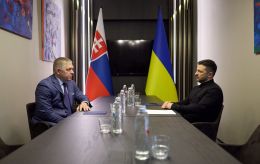Shells instead of words. Ukraine's expectations from West and war's impact on European politics
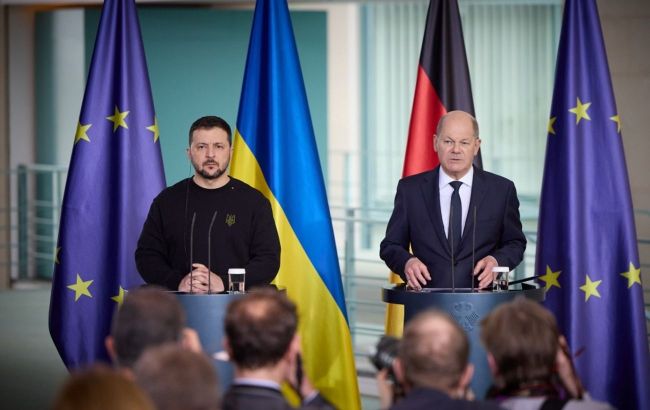 Volodymyr Zelenskyy and Olaf Scholz (Press service of the President of Ukraine)
Volodymyr Zelenskyy and Olaf Scholz (Press service of the President of Ukraine)
The 60th Security Conference took place in Munich ahead of the second anniversary of Russia's invasion of Ukraine. What messages were conveyed to and from Ukraine? Why is Europe apprehensive about Trump's presidency? Can the US and EU maintain unity? All these issues were explored by RBC-Ukraine.
"Ukraine wants peace. Europe wants peace. The world says it doesn't want to fight, and Russia says it doesn't want to attack. Someone is lying." These were the words Ukrainian President Volodymyr Zelenskyy began his speech at the Munich Security Conference two years ago. It became clear who was lying in five days - Russia invaded Ukraine, initiating the largest war in Europe since World War II.
Much earlier, in 2007, Vladimir Putin made his debut at the Munich conference. His sharp speech criticizing the US, NATO, and the "unipolar world" reminded Western politicians of the forgotten term "Cold War" and opened their eyes to the true views of the Russian president.
His grievances against the US 17 years ago soon turned into threats and aggression against Georgia and Ukraine. By destroying neighboring countries and killing thousands, the dictator "is at war with the West." Putin has long ceased to hide his plans, relying on the support of authoritarian regimes like his own.
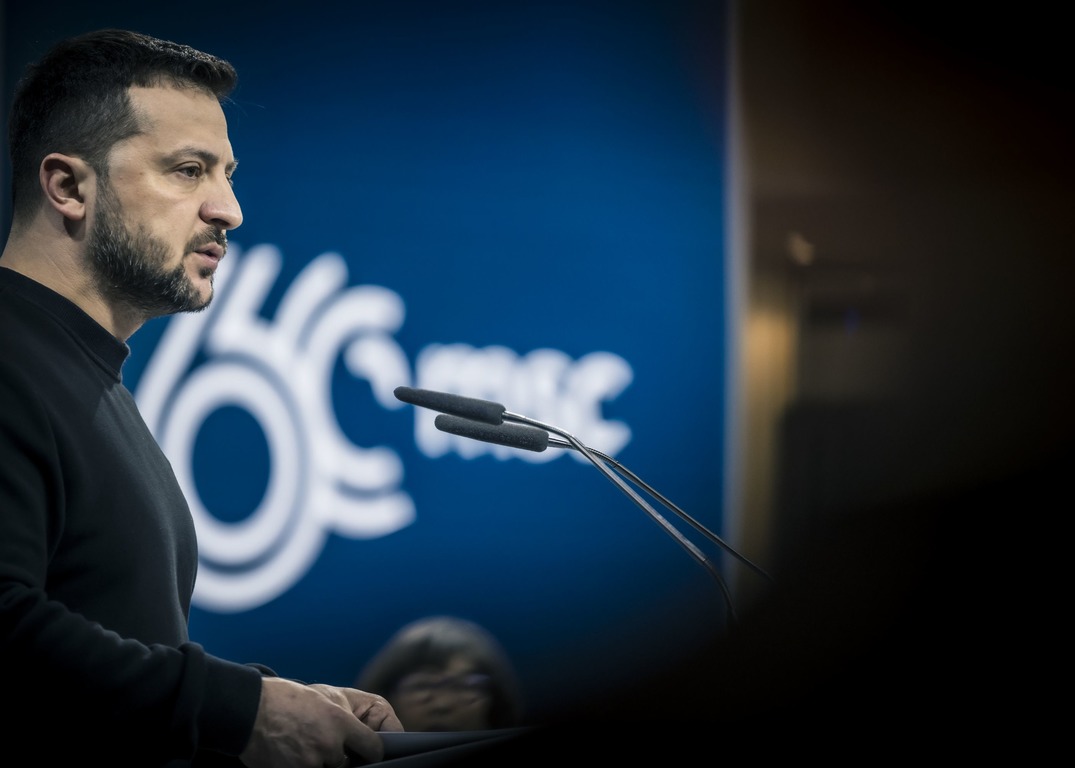
Volodymyr Zelenskyy at the Munich Security Conference 2024 (Photo: securityconference.de)
Two years of bloodshed and hundreds of thousands of losses, even among their own military, seem not to have shaken Putin's intentions to seize Ukraine. In the West, understanding this and the consequences of Ukraine's defeat, decisive action is not always taken; too much time is spent discussing problems rather than taking action, as Danish Prime Minister Mette Frederiksen reminded at Munich.
"Are we doing enough? The answer is no. When we say that "there has been a war in Europe for two years", this is a sentence we should not say. We should be supporting you much more, because Ukraine cannot win the war without weapons. Words are not enough," she said. Showing an example to partners, Frederiksen later announced the transfer of all Danish artillery to Ukraine.
"Ukraine is fighting on its own, and the only thing they are asking us for is actually military assistance to help them do it, and that is not much to ask," said Estonian Prime Minister Kaja Kallas.
Weapons and short delivery terms were the practical issues emphasized by President Volodymyr Zelenskyy in Munich. The recent failures of the Ukrainian army, such as the withdrawal from Avdiivka, were caused precisely by the lack of artillery, air defense systems, and long-range missiles. The deficit of weapons in Ukraine, the president pointed out, allows Russians to adapt to the existing intensity of the war, risking the nullification of previous successes.
"Please don’t ask Ukraine when the war will end. Ask yourself why Putin is still able to wage this war," Zelenskyy appealed to partners.
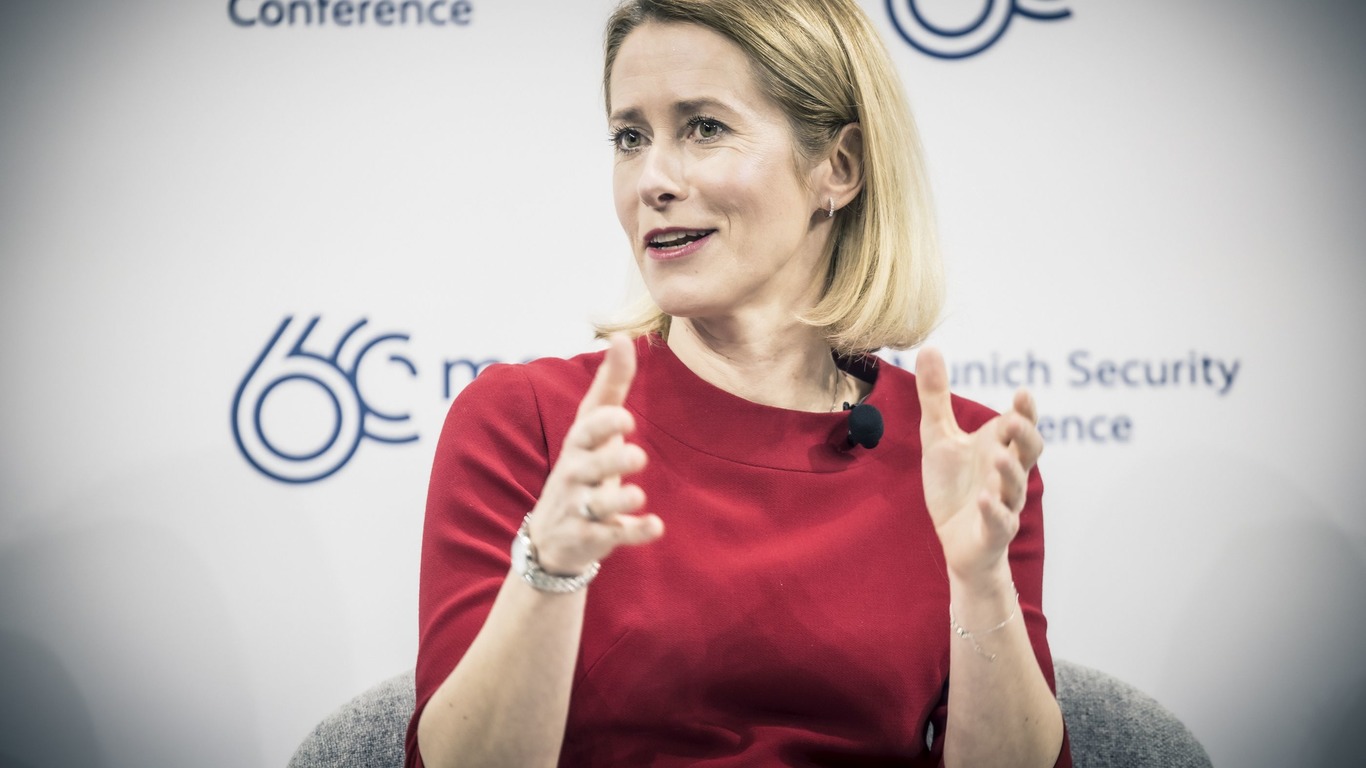
Kaja Kallas, Prime Minister of Estonia (Photo: securityconference.de)
Politicians from both sides of the Atlantic simultaneously emphasized that two years after the invasion, Ukraine has managed to liberate half of the occupied territory, thanks in part to the assistance provided by the West. However, these statements may not seem convincing to the Ukrainian public after the unsuccessful UAF (Ukrainian Armed Forces) counteroffensive last year and the pressure from Russian forces along the entire front line.
Statements about past successes against the backdrop of a stalled defense package in the US Congress for Ukraine, due to purely domestic political reasons, especially resonate. At the same time, at Munich, US Vice President Kamala Harris reiterated unconditional support for Ukraine from the Biden Administration, while German Chancellor Olaf Scholz skillfully juggled figures, reporting on Germany's assistance to Ukraine - the highest among European countries and second only to the US. However, the chancellor avoided questions about the possible supply of Taurus missiles to Ukraine, capable of reaching deep into Russian territory.
Meanwhile, Scholz talked a lot about collective responsibility for security on the continent, urging other countries to follow Germany's example in providing assistance to Ukraine and developing their defense capabilities. But not all countries are ready to spend as much on defense purposes and aid packages for Ukraine as, say, Germany, Scandinavian countries, and the Baltics (understandably, given the capabilities of their economies).
"One of the prime ministers of a country in Western Europe told me that our people are beginning to understand that we should do this (help Ukraine). This refers to those countries whose neighbors are much better off than ours. But it's too late for us; too much time has passed," confessed Estonian Prime Minister Kallas.
The Trump factor and risks for NATO
Another factor of uncertainty is the United States and the heat of the presidential election campaign there. In recent weeks, the main cause of concern for European elites has been Donald Trump and his statements that the US will not defend European allies who do not invest enough in their defense.
Essentially, Trump's messages would mean the collapse of NATO as an organization left without its key member. According to RBC-Ukraine's interlocutors among conference participants, it is still unclear how much of Trump's words are usual pre-election rhetoric and how much are real isolationist sentiments. Which, incidentally, finds an active response in perhaps half of the American electorate.
It is quite possible that Trump himself does not fully understand how he will manage American foreign policy if elected - such an opinion was voiced in the corridors of Munich repeatedly. And the utopian idea of peace in Ukraine within 24 hours may seem quite achievable to him.
With a possible change of power in the White House, which all opinion polls currently indicate, the entire Western world will find itself in a zone of incredible turbulence, especially in the first months of Trump's tenure. And the US, which has always been a key member of the Alliance, will suddenly become its weakest link.
In Munich, it was obvious that a possible Trump victory in the presidential elections in November is not pleasing to many European leaders, who, however, are ready to accept any choice of the American people, as German Chancellor Scholz said. "Regardless of how Russia's war in Ukraine ends, regardless of the outcome of the next elections on this or that side of the Atlantic, one thing is absolutely clear: we Europeans must prioritize our security now and in the future," said the head of the German government.
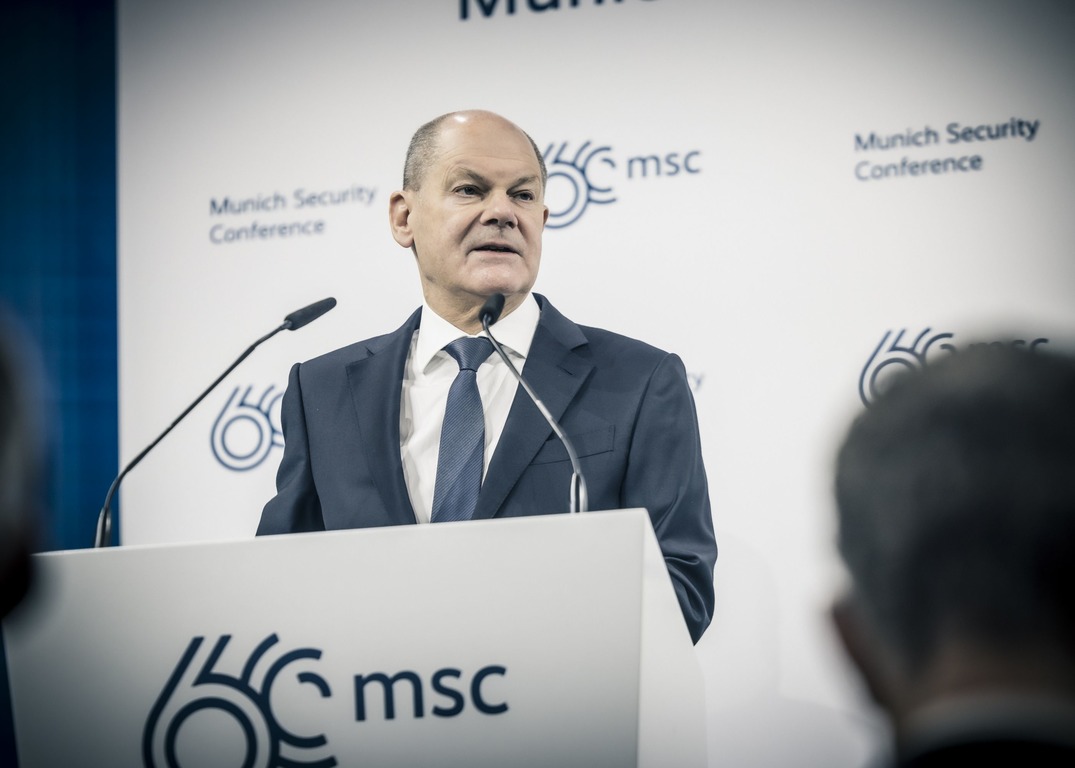
Olaf Scholz (Photo: securityconference.de)
Mark Rutte, the Prime Minister of the Netherlands, has proposed reducing the hysteria surrounding Trump by putting an end to the "moaning and groaning" altogether. According to the Prime Minister, Europe should spend more on defense and increase ammunition production, not because of Trump specifically, but as a general necessity in their own interests.
The remarks of both Scholz and Rutte are quite obvious to Ukrainians, but not to all Europeans, for whom the war seems distant and creates inconvenience due to the expenses Western countries direct towards supporting Ukraine. Within the EU, there is a complex debate over whether to bolster defense capabilities or spend money on social programs.
"We've been living in that comfort zone for three decades. We benefited from a peace dividend, as we called it. We've invested in everything but not deterrence and defense because there was nobody to deter and defend against. So this is what we are now facing, and it takes time (to explain the issue to the voters)," said German Defense Minister Boris Pistorius at a conference.
The politician does not rule out the possibility of NATO confrontation with Russia in the future, within 5-8 years, and therefore, Europe needs to be prepared to defend its borders. Regardless, Europe needs to learn greater independence now, making decisions regardless of the United States. The shift in leadership within the Western coalition, where the key role of the USA suddenly falls into the hands of collective Europe and individual countries like Germany, France, and the United Kingdom, appears to be a quite probable scenario in the very near future.
"Perhaps, Europe is facing times when the question of invoking Article 5 of the NATO treaty will not be a question for Washington at all but rather for European capitals. There are hundreds of such “perhaps”. On February 23, 2022, none of them existed. Now they are a part of reality," said Volodymyr Zelenskyy in Munich.
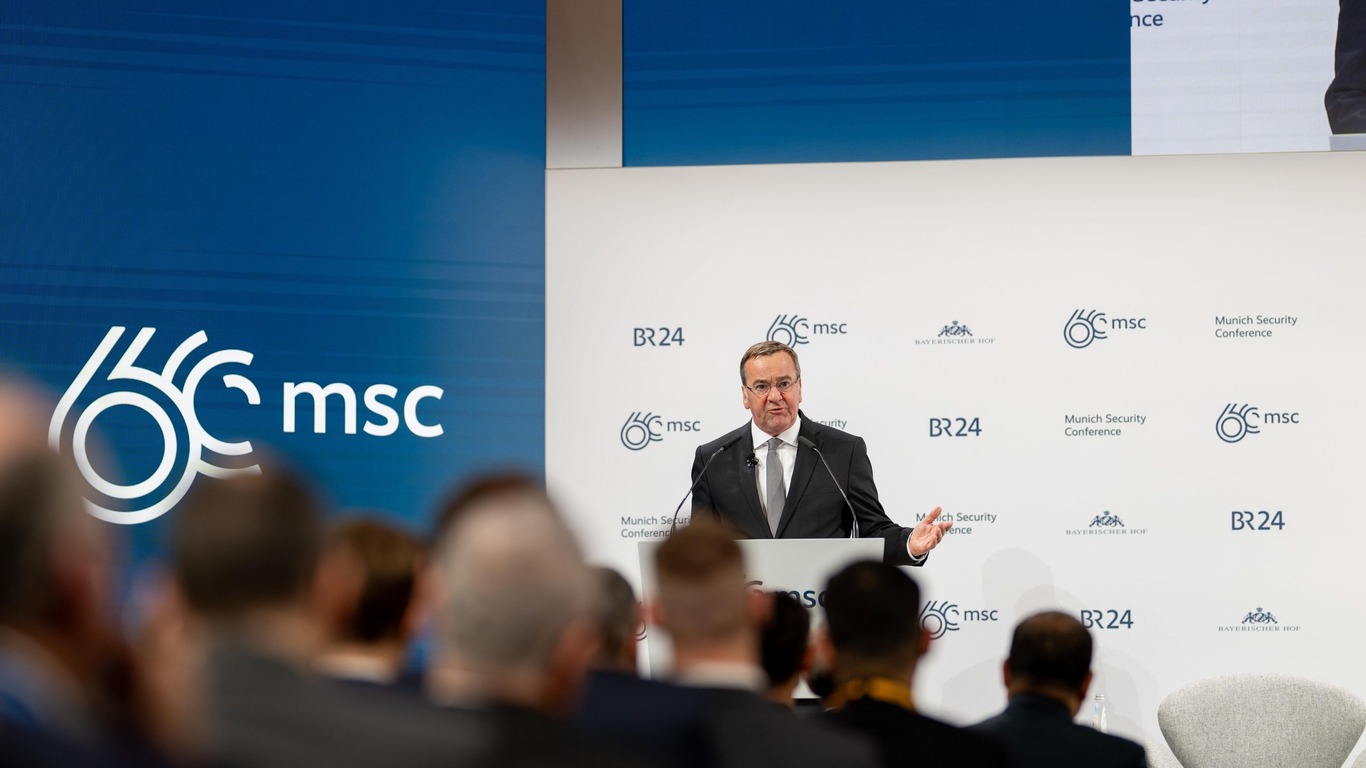
German Defense Minister Boris Pistorius (Photo: securityconference.de)
Financial support from the US causes optimism
While the prospect of the Trump presidency remains relatively distant since the inauguration of the next US president will take place only in January next year, the allocation of a new aid package to Ukraine by the United States is a highly relevant issue. Currently, the relevant bill is pending in the House of Representatives, which has gone on recess until the end of February.
Everyone RBC-Ukraine spoke with in the corridors of the Munich conference is confident: eventually, the aid package to Ukraine will be approved; the question lies only in its format and exact scope.
Almost all speakers representing the United States did not openly oppose the idea of providing assistance to Ukraine. In particular, Republican Senator Pete Ricketts told a story about meeting an American woman who did not want to send her son to war in Europe. The senator explained to her: that the US is currently helping Ukraine exactly in order for it to not be necessary.
But Ricketts was immediately caught in contradictions. When asked about what prevents Republicans from immediately voting for aid to Ukraine, he began to talk about the priority of addressing the migration problem. In response, Estonian Prime Minister Kaya Kalas provided an analogy: currently, about 6% of her country's population consists of Ukrainian refugees, which in American terms would mean 20 million people. If Estonia managed to deal with such a problem, the United States will manage as well, Kalas said.
Obviously, the entire issue of providing assistance to Ukraine boiled down to a single question – the political fate of the Speaker of the House of Representatives, Mike Johnson. Zealous Trumpists in the ranks of the Republican faction openly threaten him with resignation if he brings any bill on aid to Ukraine to a vote.
Johnson doesn't want to repeat the fate of his predecessor Kevin McCarthy, who was removed from the Speaker's chair precisely because of agreements with the Democratic Party. But this time, according to rumors circulating in the corridors of Munich, American Democrats are ready to support Johnson if the Trumpists demand his resignation. Thus, there won't be enough votes in the hall to remove the Speaker. The resolution of this months-long dramatic series can be expected in about two to three weeks, which is long overdue given the urgent needs of the Ukrainian army.
***
Ukraine pays a too high price for the delay of partners in providing assistance and supplying weapons – it pays with the lives of Ukrainian soldiers. Time is running much faster in Ukraine than for other states that support Ukraine but do not understand its pain. In this sense, summarizing all the debates in Munich, the head of European diplomacy, Josep Borrell, aptly emphasized that there is no time for summits anymore, and it is time for a different dimension of politics.
"People need to be much more flexible, engaged, precise. So far, we have many strategies but little action," the diplomat admitted. According to him, European capitals allowed themselves to hesitate too long on the issue of supplying weapons to Ukraine – starting with helmets and now preparing to send F-16 aircraft: "If we had made this decision sooner, perhaps the situation on the front would have been different."
